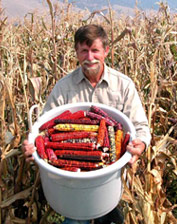New report on GMOs finds false promises, failed technologies
By Ken Roseboro
Published: November 1, 2011
Category: GM Food Environmental Risks

To access all the articles in this month's issue of The Organic & Non-GMO Report, SUBSCRIBE NOW.
A new report highlights scientific research and empirical experiences from around the globe demonstrating that genetically modified seeds and crops have failed to deliver on their advertised promises.
The report, A Global Citizens Report on the State of GMOs—False Promises, Failed Technologies, was published by Navdanya International and the International Commission on the Future of Food, with the participation of the Center for Food Safety.
Advocates of GMOs claim that biotechnology increases yields, reduces chemical usage, controls crop pests and weeds, and delivers “climate ready” traits such as drought-tolerance. However, the on-the-ground experience in many countries discloses that this technology has failed on all fronts.
For example, GMO proponents often hail the success of GM cotton in South Africa’s Makhatini Flats. But after initial, highly visible headlines of success, this report reveals a different story. Instead of thriving crops and increased farmer incomes after five years. the majority of farmers growing GM cotton are in debt due to the high costs of seed, chemicals, and other farm inputs. Concurrently, the volatility of the cotton market means that farmers cannot rely on predictable, steady incomes. The essays contained in this Global Citizens Report confirm that such experiences are repeated in many countries and regions. The story of Indian farmer indebtedness and over 250,000 suicides further emphasizes the tragic costs of this failed GM technology.
Farmers and agronomists throughout the world are alarmed by the growing epidemic of weeds developing a resistance to the herbicide glyphosate used on GM crops. These “superweeds” have evolved resistance to glyphosate as a result of the intensive use of this herbicide. From November 2007 to January 2011, infested acreage in the US has more than quintupled, from 2.4 to 12.6 million acres. In Brazil, researchers have reported that nine species have developed tolerance to glyphosate.
And now super pests are also becoming a major hazard. Rootworms are developing a resistance to GM corn in Iowa and Illinois. And Monsanto, the undisputed leader in GM seed and crop technology and ownership, has, after several years, finally acknowledged that a bollworm pest has developed resistance to its Bt cotton in India.
Another common story detailed in this Global Citizens Report describes how GM technology is pushed by intensive lobbying and marketing efforts, “revolving door” influences, and funding of research and educational institutes. As noted in the report from the US, the leading proponents of GM crops—top food and agricultural biotechnology firms—spent more than $547 million lobbying Congress between 1999 and 2009.
Finally, the report documents increasing scientific evidence and warnings from scientists that GMOs may be harmful to human health and ecosystems, and that they have failed to increase food production. It highlights that, in contrast to GM seeds and crops, agroecological farming systems are proving to be the real answer to food insecurity. A recent study by the United Nations Special Rapporteur on the Right to Food reported that agroecological systems doubled crop yields over a period of three to 10 years in field tests conducted in 20 African countries. The report also cites numerous other studies confirming high yields and reduced chemical use in other regions of the world due to agroecological farming methods.
The full report is available at www.centerforfoodsafety.org.
© Copyright The Organic & Non-GMO Report, November 2011





